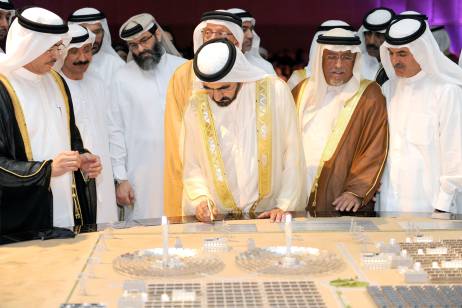政府官员宣布的,迪拜规划一个数十亿迪拉姆太阳能能源公园,以减少对化石燃料的依赖,并减少其碳排放。太阳能公园将建成分阶段在未来二十年,旨在到2030年达到了1000兆瓦(MW)的产出能力。...
政府官员宣布的,迪拜规划一个数十亿迪拉姆太阳能能源公园,以减少对化石燃料的依赖,并减少其碳排放。太阳能公园将建成分阶段在未来二十年,旨在到2030年达到了1000兆瓦(MW)的产出能力。
该项目将位于东南30公里的迪拜铝达哈尔,将占用空间约48平方公里。该项目将首先建立一个10MW的太阳能发电厂。这家工厂将使用光伏技术和长期保护性电价电力电网。工作已经启动的项目,应耗资约Dh120万元。顾问公司已被选中,招标兴建的设施,应该是今年夏季。该项目预计将在2013年底投入运营。“我们有一个计划,通过太阳能发电为迪拜提供以多样化的能源,2020年到1%,到2030年到5%” 能源最高委员会副主席赛义德说。
新的太阳能公园将利用太阳能光伏发电,以及被称为集中太阳能发电,在阳光的反映从大镜子,行至一个较小的区域,太阳的热量是收集,然后用来产生能量的另一种技术。
“从经济角度来看,太阳能能源需求的贡献”,能源最高委员会的行政长官秘书长Nejib Zaafrani说。鼓励太阳能项目的投资方式可以包括建立优惠关税或可再生能源生产者提供补偿。这些措施的出台,也被称为长期保护性电价,已经在德国和西班牙之间建立世界领先的清洁能源的国家。Zaafrani先生先生说,长期保护性电价被认为作为一个选项,但这个问题需要进一步研究。
“Zaafrani先生说:”第一10MW 电站将由迪拜能源最高委员会100%的资助。 “对于未来的项目,达到千兆瓦,我们的工作在许多方面。”而太阳能电厂的优势 - 不释放温室气体,从而为植物,燃烧化石燃料的环保型替代吹捧 - 他们是更昂贵的建设。
好消息是,由于在技术进步和使用量的增加,价格一直在下降。铝塔耶尔先生说,2004年,耗资120亿DHS产生一个千瓦的电力使用太阳能技术,但现在的成本是亿DHS。“我们希望在未来,我们将迎来更多的优质在价格”他说。
阿布扎比公司太阳能光伏发电系统Enviromena电力系统的行政长官萨米Khoreibi说,该项目的推出是朝着正确方向迈出的一步。“这是太棒了。这是另一种为在中东地区的可持续能源市场的地方,我们将在这些项目的时机很感兴趣。
DUBAI // The emirate is planning a multi-billion-dirham solar energy park to reduce its dependence on fossil fuels and decrease its carbon footprint, officials announced yesterday.
Related
■ China lights up UAE solar future
Topic Sheikh Mohammed bin Rashid Alternative energy Dubai The Mohammed bin Rashid Al Maktoum solar park will be built in phases over the next two decades, aiming to reach a capacity output of 1,000 megawatts (MW) by 2030.
The launch event in Dubai yesterday was attended by Sheikh Mohammed, the Vice President and Ruler of Dubai, after whom the park has been named.
The facility will be located in Seih Al Dahal, 30 kilometres southeast of Dubai and will take up approximately 48 square kilometres of space.
"We have a plan to diversify the energy [sector] in Dubai and to increase solar power to 1 per cent by 2020 and 5 per cent by 2030," said Saeed Al Tayer, the vice chairman of the Supreme Council of Energy.
Dubai produces 4.5MW of solar power in private, small-scale systems. These systems use photovoltaic (PV) technology, which converts sunlight into electricity.
The new solar park will utilise solar PV as well as another technology known as concentrated solar power, in which sunlight is reflected from large rows of mirrors on to a smaller area where the sun's heat is collected and then used to produce energy.
The details of how the emirate hopes to increase its output from 4.5MW to 1,000MW, and exactly who would foot the Dh12 billion construction bill for the facility, have yet to be announced.
"We are going to award a contract to an international consultant where they will submit a road map of how to get there," said Mr Al Tayer, who is also the managing director and chief executive of the Dubai Electricity and Water Authority (Dewa).
The consultant will advise on how to connect the new solar capacity to the electricity grid and on how to encourage investment.
"From an economic point of view, solar energy needs a contribution," said Nejib Zaafrani, the Secretary General and chief executive of the Supreme Council of Energy.
Ways to encourage investment in solar projects could include establishing preferential tariffs or providing compensation to renewable-energy producers. The introduction of such measures, also known as feed-in-tariffs, has been instrumental in establishing Germany and Spain among the world's leading countries in clean energy.
Mr Al Tayer and Mr Zaafrani said feed-in-tariffs were being considered as one option, but the matter needed further study.
The project will begin with the establishment of a 10MW solar plant. This facility will use PV technology and will feed electricity to the grid. Work has already started on the project, which should cost about Dh120 million.
Consultants have already been selected, and a tender to construct the facility should be out in summer this year. The project is expected to be operational at the end of 2013.
"The first 10MW ... is financed 100 per cent by the Supreme Council of Energy in Dubai," said Mr Zaafrani. "For future projects, to reach one gigawatt, we are working on many fronts."
While solar energy plants have the advantage of not releasing greenhouse gases - and are thus touted as eco-friendly alternatives to plants that burn fossil fuels - they are more expensive to build.
The good news is, because of advances in technology and an increase in use, prices have been falling. Mr Al Tayer said that in 2004, it cost 120 fils to produce a kilowatt of electricity using solar technology, but that the cost is now 70 fils.
"We hope that in future we will witness more decreases in price," he said.
Sami Khoreibi, the chief executive of Enviromena Power Systems, an Abu Dhabi company that builds solar photovoltaic systems, said the launch of the project was a step in the right direction.
"It is fantastic. It is another market place for sustainable energy in the Middle East," he said. "We will be very interested in the timing of these projects."







